Andy Wood: Crypto-assets & tax Part 1- General principles & taxation of cryptocurrencies (i.e. fungible tokens)

Andy Wood
Andy Wood is a tax adviser and Barrister with ETC Tax. His clients include entrepreneurs, high-net-worth individuals, sports persons and entertainers and private companies. He believes passionately that all clients should get clear and decisive advice that should be delivered in plain English.
Introduction
OK, so I sit here putting this article together as bitcoin and other cryptocurrencies have capitulated over the last week or so. However, like Mark Twain, I suspect the reports of cryptocurrencies demise are greatly exaggerated.
As such, whether you are looking to go all in and ‘buy the dip’ or a keeping more of a watching brief as a professional adviser, then it perhaps is helpful to have an understanding of the relevat tax issues.
This is the first of two articles that Berman’s have kindly asked me to write. This focuses on the general principles and the tax treatment of fungible tokens such as bitcoin and Ethereum. The second article will look at Non-Fungible Tokens (“NFTs”), mining and other transactions.
Government’s response to cryptocurrency and tax
Crypto caught most governments napping. That said, HMRC was relatively quick off the mark setting out their views back in March 2014. However, this briefing was somewhat thin. More dangerously, it left the reader with the take away that a transaction could be “so highly speculative that it is not taxable…” It’s unclear why HMRC ever thought this. But it remains an enduring misconception for a minority of crypto investors.
Further policy updates took place in the intervening years before HMRC’s views were consolidated into the Crypto-assets Manual (published in March 2021). This is a far more rigorous piece of work and is well worth a read for those interested, or with clients, in the space.
Buying, selling and holding cryptocurrency / fungible tokens (excluding NFTs)
General
Cryptocurrency is a developing area of law, but one should not become overly pre-occupied with the underlying assets for tax purposes. The UK tax system is primarily focused on what one does with assets. This is no different to transaction involving property or shares. Our first consideration will be whether a transaction is an investment or of a trading nature.
What is a fungible token?
An odd term I will grant you. But broadly, we are talking coins like Bitcoin, Ethereum or, Elon’s favourite, DogeCoin. Broadly a fungible item is one which is mutually interchangeable with another identical item.
Fungible items tend to inhabit the financial world. For example, I may own 100 shares in Tesla. When I acquired these shares I was not really bothered precisely which 100 shares I acquired. Further, if I sell 50 off them, I am not concerned with which 50 out of the 100 I sell. However, one could argue that, since shares have numbers, then they are not truly fungible. It is perhaps best to say it is in everyone’s interest to treat them as fungible. For CGT purposes, shares are generally added to a pool for this very reason.
Bitcoin and other cryptocurrencies are also fungible assets in the same way. If you are very lucky, you might own multiple Bitcoin. On the other hand, you might own a trillion small cap coins. However, no one really cares precisely which ones you are buying and selling.
Are the activities of an investment nature?
‘Investment’ will be the default position for someone buying and selling crypto. This presumption might be rebutted where the activities are so organised that they can be classed as a venture in the nature of trade.
Of course, where one’s activities are considered as investment then, any profits or losses on disposals will fall within the capital gains regime. Note that, despite the 2014 guidance, cryptocurrency is not considered a real currency and is not within the rules that apply to foreign currency gains. If you want to move to a country that treats bitcoin as legal tender, you should look up flights to El Salvador!
What constitutes a disposal?
There are a number of ways one can trigger a disposal in this space. In the cases we encounter, it is this issue that leads to most non-compliance.
The following are likely to trigger a disposal:
- Swapping one crypto to another (eg Ethereum (“ETH”) for Solana)
- Sale for fiat currency such as GBP:
- A gift of coins: say from a parent’s wallet to a child
- As a medium of exchange: if one uses a fraction of a Bitcoin to purchase a pint at your favourite crypto savvy watering hole
Pooling
Pooling is really to make things easier as it stops us having to try and identify which fungible item was bought and sold. The result is that coins and fungible tokens will be placed in separate ‘pools’. This might for example, lead to an investor might having separate Ethereum, bitcoin and a Dogecoin pools. Broadly, the result is that when we sell assets from the pool, we use a simple average purchase cost when calculating the gain on a particular disposal.
Exceptions to the ‘pooling’ rule
- the ‘same day rule’ (TCGA 1992, s105); or
- the 30-day bead and breakfasting rule (TCGA 1992, s106A) applies.
Allowable costs
There can be quite significant costs of transacting on centralised (Coinbase, Binance) and de-centralised exchanges (PancakeSwap, Uniswap). For example, transactions in ETH will likely incur ‘gas fees’ as a cost of doing business.
Common fees include:
- The fees for swapping GBP (or other fiat) for crypto
- The fees for swapping crypto for GBP (or other fiat)
- The fees to swap one crypto for another
Staking
One can ‘stake’ one’s crypto on an exchange and earn rewards. This is usually in the form of more tokens. The receipt of staking rewards is likely to be treated as miscellaneous income.
Airdrops
An airdrop is generally used as a marketing tactic to build a crypto project and involves small amounts of newly ‘minted’ (issued) crypto being paid to coin-holders. Generally, there is no tax due on the airdrop – however, the airdropped assets will need to be added to a new or existing pool for CGT purposes.
Capital losses
It is a fair rule of thumb that if one is taxable on the gains resulting from certain activities then the corollary is that the losses should be allowable.
A capital loss may be:
- Offset v current year gains; or
- Carried forward indefinitely
Lost wallets, rug-pulls and scams
We regularly hear about the unfortunate James Howells. He believes his lost digital wallet, containing 7,500 bitcoin (valued at over £200m), currently resides somewhere within Newport City landfill site. It is perhaps of little comfort to Mr Howells that he could potentially make a negligible value claim offsetting this loss if he can show that he is unable to recover it.
A rug-pull is a crypto ‘term of art’ and describes a scenario where a crypto project ‘pumps’ in price, attracts investors drunk on the fear of missing out. However, once the price has spiked, those connected with the project and ‘in the know’ dump their tokens leaving the price to crash. Those others are left holding worthless tokens. Here, one would clearly be able to utilise this capital loss following either a disposal or negligible value claim.
The victim of a simple scam, such as where the project is non-existent projects, will obtain no relief.
Residence and domicile
The basic rule for UK CGT purposes is that no CGT is payable on the disposal of any assets where the individual or entity is non-UK resident. This is subject to:
- Non-Resident Capital Gains Tax for UK real estate; and
- Anti-avoidance provisions, including the temporary non-residence rule
As a result, many crypto investors will be operating their portfolios from laptops overseas in benign jurisdictions such as Portugal or attempting a more ‘nomadic’ lifestyle.
The second issue here is that of domicile. A UK resident but non-domiciled individual (“UKRND”) may only be subject to tax on the remittance basis and in the privileged position that foreign gains are only taxable where they’re brought to, used in or enjoyed in the UK. But is that a privilege of which a crypto investor might take advantage?
Bearing in mind how crypto-assets are created, one might be forgiven for thinking it is highly unlikely they will be UK situs. However, HMRC’s view is that “the location of the cryptoasset will be determined by the residency of the beneficial owner”. Although there are multiple attractions here for HMRC, I do not believe this has any basis in existing law.
Firstly, there is no reason why the existing rules for intangible properly do not already deal with the situs of crypto-assets. Secondly, the Courts have recently come up with slightly different conclusions in non-tax cases (Ion Science Limited v Persons Unknown (unreported), Fetch.ai v Persons Unknown [2021]).
One takeaway is that the picture is far from clear and the law might benefit from clarification. In the meantime, UKRND’s should consider using non-UK structures to hold crypto-assets in order to eliminate some of this uncertainty.
Are the activities of a trading nature?
Where an individual is found to be trading then any profits will be subject to the generally higher rates of personal tax as well as well as imposing NIC implications. The other side of the coin is greater flexibility around trading losses which can be carried back multiple years.
‘Trade’ is defined, in somewhat circular fashion, by ITA 2007 s989 as ‘any venture in the nature of trade’. Unsurprisingly, the issue has been left to the courts.
When it comes to adding to this, there is little (if any) crypto-asset specific case law. However, there is plenty of analogous case law as to where the dividing line is when transacting in shares and other financial instruments. Usually, the taxpayer has made a loss and is looking to offset them against general income.
An in-depth discussion of the case law is beyond this article. However, the more recent cases of Akhtar Ali[1] and Rajesh Gill[2] are instructive and provide helpful consolidation of the existing, relevant case law. In both, that “prima-facie presumption… that he is not [trading]” was be rebutted by the fact-finding tribunals. Largely, this was because the Appellants operated by reference to a business plan (albeit unwritten in both) and the activities were sufficiently “deliberate and organised”.
The same considerations will typically apply to crypto-assets. The presumption can be rebutted where the taxpayer demonstrates a deliberate and organised manner of operating.
Next article
My next article will consider the tax issues and opportunities around Non-Fungible Tokens and other activities such as mining.
Contact
Andy Wood, ETC Tax
e: andy.wood@etctax.co.uk
t: 0161 711 1320
References
[1] Ali v Revenue & Customs Commissioners [2016] UKFTT 8 (TC)
[2] Gill v Revenue and Customs Commissioners [2018] UKFTT 0245 (TC)
 |
| 

